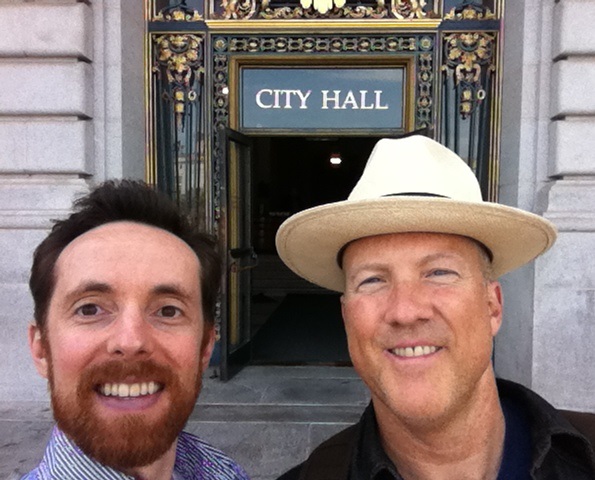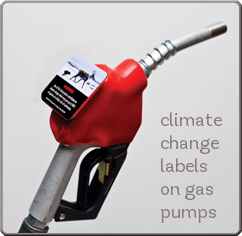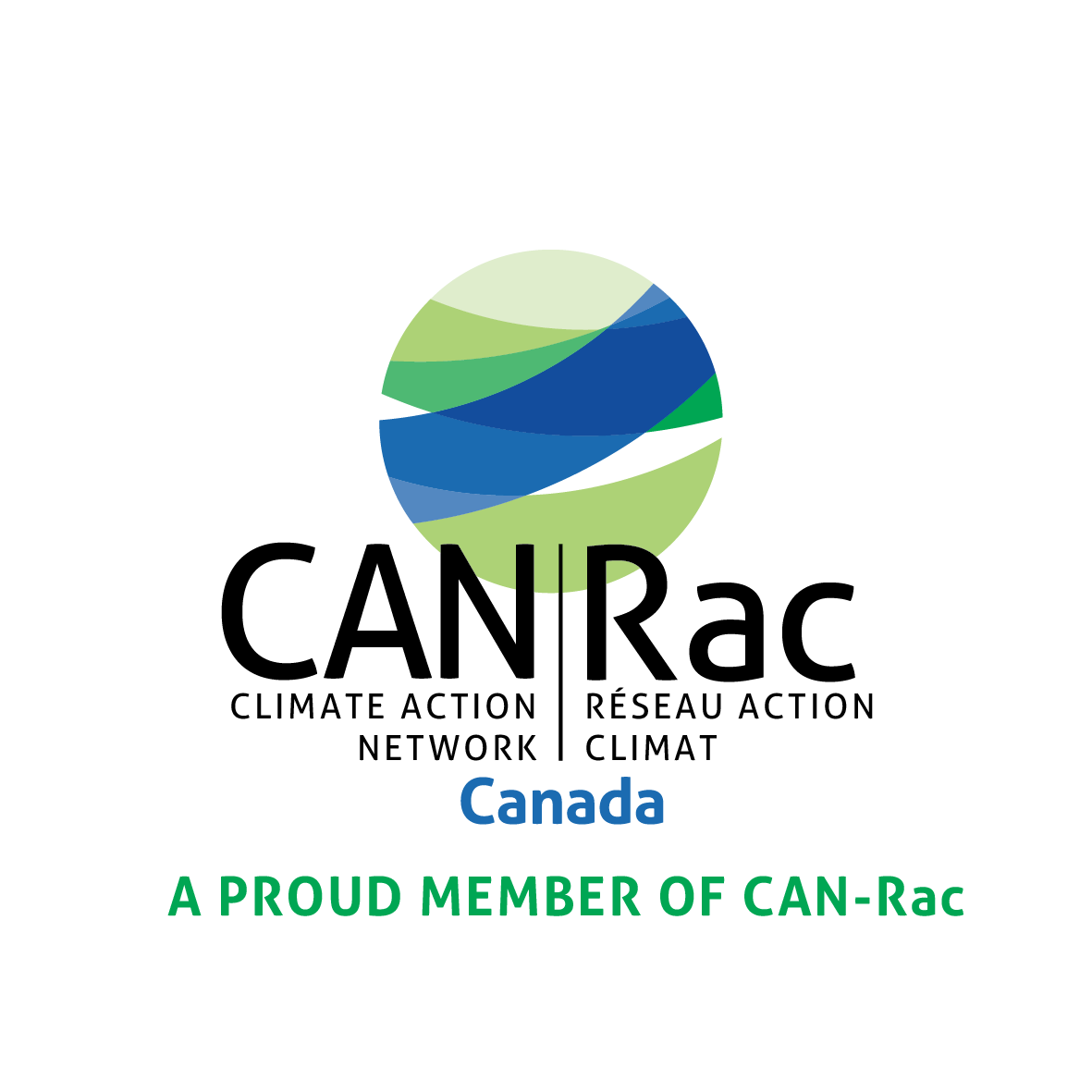Think Beyond The Pump (James Brooks)
We have been generously hosting Jamie Brooks’ bio and contact information on this page for several years. Unfortunately, we recently learned that Jamie has been misrepresenting himself and that this page contained factual errors that we were obligated to update.
 Jamie Brooks is the founder of the non-profit, Think Beyond the Pump, established in August, 2020. While his organization does not yet have a website, we look forward to sharing it one day.
Jamie Brooks is the founder of the non-profit, Think Beyond the Pump, established in August, 2020. While his organization does not yet have a website, we look forward to sharing it one day.
This photo was taken in April, 2015, in front of San Francisco’s City Hall when Rob (L) visited Jamie (R) to help him with his advocacy efforts in the Bay Area. Rob loved visiting Jamie. His favourite part? The lecture he gave at Stanford Law that was catered by Chipotle! He’s been obsessed with Chipotle ever since.
Jamie first approached Rob during the summer of 2013, shortly after he read about Our Horizon’s work in an April 2013 article on Yahoo News, then the top ranked news website in the world. He was asking if Rob could help him start a similar campaign to get climate change warnings on gas pumps in the Bay Area. It was one of many ideas that an environmental group he was volunteering with had been exploring at the time. When Jamie reached out, Our Horizon’s work – first begun during the summer of 2012 – was getting legislative traction in Canada and media attention around the world. In fact, it had even already been voted on by a municipality at the time.
Here’s some coverage from The Nation that summer. We also made Upworthy, a website that, at the time, boasted 80 million unique views a month, or more people than tuned into the series finale of Seinfeld! Even Deutsche Welle, Germany’s public international broadcaster, had covered our work. Of course, we also have to acknowledge our first big media piece from February, 2013 in the Toronto Star, Canada’s largest daily print newspaper. Here’s an excerpt:
And if Toronto doesn’t bite, he’s convinced that some other progressive municipality – in Ontario, Canada, or somewhere else in the world – will take the lead and cause the kind of ripples that made smoking, pesticide and shark fin soup bans more commonplace. Shirkey is committed to making it happen. He has wound down his law practice. His grandfather’s money has been used up, so he’s now tapping into savings. “I’m going for broke on this, literally,” he says. “It’s something I believe in.
Jamie’s first email to Rob read, “Looking forward to meeting you and picking your brains; we are very much in the preliminary stages of our campaign…”. A week later, Rob shared all of the research and strategy behind his work in a lengthy video call. Rob also emailed a variety of resources that he had first started to develop almost a year prior to help Jamie launch his effort. After that tutorial, Jamie wrote, “Great talking to you too; a bit on the steep, upward slope of the learning curve right now after our talk, but there’s more clarity about what’s involved too! I feel fairly overwhelmed with all the info myself, but your research (done already) will save us some time to focus on publicity and approaching supervisors/city attorneys.”
Over the weeks and months that followed, Rob would type lengthy responses to Jamie’s numerous questions over email, give advice and support over regular phone calls and video chats, and send digital and print materials for him to use in his lobbying efforts. While Jamie was using Rob’s research to give his first talk to a group of students, Rob had just delivered a TEDx talk after having recently completed a cross-Canada tour where he shared his idea with community groups, universities, and politicians from coast-to-coast. It was so inspiring to see Jamie speak words that Rob had first written over a year prior.
In December of that year, Jamie wrote to ask if he could start an Our Horizon group in the U.S. because, “We are essentially duplicating your approach anyway, and therefore no need to reinvent the wheel.” While we were flattered by this, our preference has always been to encourage people to take our work and run it under their own banner. We’ve never wanted credit, we just wanted to see an idea proliferate. We’ve just been grateful to have had the opportunity to help him in his efforts in Berkeley and the rest of the Bay Area.
A few years later, Jamie even asked to be our employee – not to actually contribute as one, but rather to derive benefit from the association. While we respectfully declined, we did amend this page by using his suggested language of “offshoot campaign” and “collaborate” to try to help him out. Nevertheless, Jamie was so fond of our work that he decided to claim to be our Communications Director on LinkedIn for five years! We just learned about this a few days ago.
Jamie then used this supposed affiliation with Our Horizon to secure various writing opportunities. For example, at the Huffington Post, his byline reads, “Jamie Brooks is the advocacy director for OurHorizon.org in Canada…”. What a surprise it was to read that! That’s Rob’s role. Meanwhile, at Mobility Lab, he claims to be our “Communication Director” and seems to suggest that he was somehow involved with our legislative successes in British Columbia. When we first advertised the position of Communications Director, we received dozens of resumes for the role from across Canada and even some from the U.S. The position was ultimately filled by an exceptional young woman who had just completed her Bachelor’s Degree in Environmental Biology at McGill University. Is he taking credit for this young woman’s work?
After giving Jamie so much, Rob felt hurt, betrayed, and, frankly, a little nauseated, that Jamie would leverage his life’s work and, in at least one instance, seemingly claim to be him, to help secure professional opportunities. Unfortunately, Rob only noticed all of this recently as a traumatic brain injury he experienced in late 2016 and then another in the fall of 2018 meant that he wasn’t been able to tolerate too much time on his laptop to follow Jamie’s activities. In spite of this, Rob still tried to help Jamie as best as he could.
Now it appears that Jamie has used this portfolio to help secure a recent writing opportunity at Grist. In this piece, he claims that the idea for warning labels began in Berkeley when he first proposed it six years ago. That’s strange. No mention of any of the foregoing or the fact that, in his words, he was “essentially duplicating [our] approach”. In fact, in his article, he actually links “Think Beyond the Pump” to the very webpage you’re reading because, beyond his Twitter account (which was created three years after ours), his organization has no web presence. Imagine that: Think Beyond the Pump’s supposedly pioneering work is on… Our Horizon’s website!
Moreover, please do take a moment to look at the agenda packet that councillors in Berkeley received in June 2014, the critical date he mentions in his article. We wonder who’s contributions proved to be most helpful to decision-makers: The 3-page letter from the Western States Petroleum Association, the brief email from Jamie, or the 42-page report from Rob?
With respect to the recent news in Cambridge, we had first started sharing resources with local advocates and city councillors in 2015 / 2016. Unfortunately, we don’t know what sorts of claims Jamie is now making about this story because, after being confronted with the foregoing, he blocked us on LinkedIn and social media, but it appears as though he’s trying to erase our contributions here, too. More generally, it appears that he’s now done using Rob and is cutting all ties to help bolster his various claims. Why? He told Rob that he wants to take credit for all this work for career purposes. The truth doesn’t matter. It looks like he’s being fairly transparent about his motivations over social media.
Lastly, on irony: ultimately, climate change warning labels are about disclosure, transparency, and honesty. They’re about telling the hidden story; about communicating a full accounting, even if it’s a story you’d rather not tell or rather not hear. Unfortunately, his actions have been the complete antithesis of the very thing for which he purports to advocate. We hope this isn’t lost on Jamie. We hope that one day he decides to embody the spirit of this work.
It’s been a privilege to have supported Jamie over the years and to even have provided a reference for his continuing education. He truly has much to celebrate. We are tremendously appreciative for all that Jamie has done to share our campaign in his own community, much like other advocates have in communities across North America (e.g. Canada’s west coast, east coast, and Seattle).
As for Rob, he sincerely regrets this distraction and still wants the focus to be on the work itself. If you’d like to help boost his advocacy, please watch and share the video below that he created a few months before he experienced his first concussion. While it’s a bit dated, it’s still one of the best resources online that helps explain some of the thinking behind climate change warnings for gas pumps. You can also look forward to the release of his forthcoming book, The Banality of Oil.
Media inquiries: communications@ourhorizon.org
Please note that this page was updated on December 27, 2020. We have been generously hosting Jamie’s bio and contact information here for over four years. Unfortunately, we recently learned of some factual errors and were obligated to update this page.











